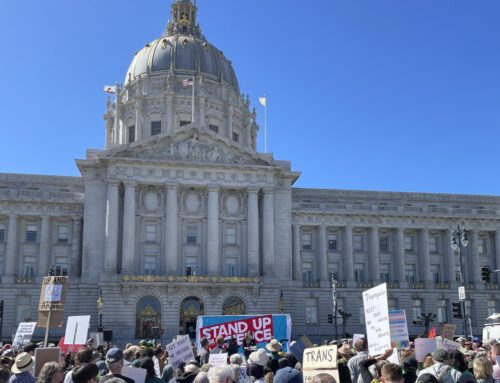
NOVEMBER 17, 2021
PSR Member News, Action Updates, Anti-Nuclear and California Policy Watch, and More
During the first two weeks of November, as we watched Congress haggle over Biden’s infrastructure and Build Back Better plans, oil executives testify at congressional hearings attempting to hold them accountable, and world leaders posture at the United Nations Climate Conference (COP26), we were painfully aware of how crucial our efforts are to hold government and corporate leaders more accountable.
To keep our planet from warming more than 2.7 degrees Fahrenheit (about 1.5 degrees Celsius) the world’s nations need to cut green-house gas emissions in half by 2030. The world leaders’ COP26 pledges (if they keep them) put us on track for warming of 1.8 Celsius according to the Climate Action Tracker. But others are reporting that their pledges place us on track for about 4.3 degrees Fahrenheit (2.4 Celsius) warming which would be catastrophic. Next year, leaders have another chance at COP27. So, in 2022, it is crucial that we keep the pressure on governments, corporations, and financial institutions to end fossil fuels and build a just transition to a green global economy.
One of the most promising take-aways from the COP26 conference is that health-care voices were more central and amplified than at previous conferences, framing the climate crisis as a public health crisis. Before the conference, the Lancet and an unprecedented number of medical journals (more than 200!) published a call for governments to take emergency action to limit global temperature increases, restore biodiversity, and protect health.
At the conference, the Healthy Climate Prescription letter, signed by over 45 million health professionals (including SF Bay PSR) from around the world, was delivered by the Climate and Health Alliance to COP26 leaders. YES magazine’s response to COP26 included a list of 10 reasons to be optimistic about climate solutions without being naïve, and reason number seven states “Increased focus on the link between the climate crisis and public health.” Meanwhile, the US Health and Human Services unveiled their Climate Adaptation and Resilience Plan and Policy statement aligning the US healthcare sector with prior Paris Climate Agreement goals.
Here are more of our take-aways from COP26:
1. Overall, the COP26 agreement establishes a clear consensus that all nations need to do much more, claims to keep alive the goal of only 1.5C warming with 90% of the world now pledging to reach zero emissions, and it finalizes the outstanding elements of the Paris Climate Agreement. Here is the proposed agreement outline that is called a “non-paper” (that is truly the name). Here is the COP26 Agreement
2. Environmental injustice mirrors the unequal distribution of wealth—the countries that have benefited least from fossil fuel-powered growth are suffering the most from climate change.
3. Rich nations pledged over a decade ago to give $100 billion a year to the Green Climate Fund to help poorer nations adapt to climate change and transition to green energy. That has not happened, but they renewed their vow.
4. There is a huge gap between green-house gas emissions declared by nations and their actual emissions. Sometimes the discrepancies are due to outright deception, but they are often caused by countries using different measurement methods and calculations to obtain their data. READ the Washington Post investigation. READ MORE about emissions research at Stanford’s Global Carbon Project.
5. The leaders of Russia, Brazil, and China were not at COP26, but the fossil fuel companies had over 500 representatives there, more than any country. The good news is that efforts to counter the power of the fossil fuel industry are being stepped up. Below are three recent examples.
The Beyond Oil and Gas Alliance (BOGA) was officially launched at COP26. BOGA is the first diplomatic initiative to bring together countries and jurisdictions that have committed to ending licensing for new oil and gas exploration and production and are setting an end date for their production, acknowledging the need for governments to manage the phase out of fossil fuel production as a key tool to address the climate crisis. READ the PRESS RELEASE
The Fossil Fuel Non-Proliferation Treaty (Global warming, like nuclear weapons, is a global existential threat) was first introduced in September and gained more support at COP26 with countries, cities, environmental groups, scientists, health institutions representing over 100,000 doctors, and others calling on governments to urgently commence negotiations to develop, adopt and implement the Fossil Fuel Non-Proliferation Treaty laying out a binding global plan to end new expansion of fossil fuel, phase out existing production of fossil fuels in a manner that is fair and equitable, and invest in a transformational plan to ensure 100% access to renewable energy globally, and support a global just transition. READ the TREATY
Back in the US, the Fossil Free Finance Act was first proposed by Senators Ed Markey and Jeff Merkley, and would require the Federal Reserve to ban the financing of any fossil fuel projects or activities, effectively cutting off the flow of funds from big banks. This bill is supported by major environmental NGOs and could serve to strengthen the growing movement for fossil-fuel divestment. READ MORE
6. A promising take-away from COP26 is that other proposals and agreements were developed during the conference including an agreement between China and US to cut emissions, 100 countries vowing to end deforestation by 2030, and more than 100 countries agreeing to cut emissions of methane by 30% by the end of this decade.
In summary, while far too-limited in its promises and concrete outcomes, COP26 provides us a basis for redoubling our efforts for the more substantive changes our collective survival requires.
We invite you to join us in strengthening our fight for planetary health by joining SF Bay PSR’s many actions, events, committee projects, support for community-led environmental justice initiatives, and mentorship of youth health activists who will inherit our world.
1. Please DONATE. We have an END-OF-YEAR MATCHING Gift Opportunity!
Help us to raise $20,000 by the end of 2021 and an anonymous donor will give us $20,000 more, effectively doubling the impact of your gift.
2. Join our committees and help with our ongoing projects in divestment, education, electrification of buildings and other infrastructure, and so much more. Email Tara@sfbaypsr.org.
3. Take action via our action alert emails and follow us on Twitter @SFBayPSR to make your voice heard by policy makers.
THANK YOU!
PSR MEMBER NEWS
Congrats to SF Bay PSR Committee Member Dr. Robin Cooper for officially being recognized as an ally and partner of Climate Psychiatry Alliance. She co-wrote with medical student Rei Takver, “Climate Psychiatry 101 Overview,” an educational overview of the mental health aspects of climate change. Also, are you looking for that perfect holiday gift for a child? Dr. Cooper recommends these books designed to help children cope with climate anxiety, Coco’s Fire, and Fur and Feather Stand Together.
Bravo to SF Bay PSR Committee Member Dr. David Bezanson for extraordinary work advocating for the CalPERS board to consider divesting from fossil fuels, and helping to pass AB 1346 that will phase out the sale of gas-powered leaf blowers, lawn mowers and other small off-road engines in California by 2024.
Bravo to SF Bay PSR Board Member Dr. Michael Martin for his a letter to the editor, “Cows are the Problem,” in the San Francisco Chronicle.



CONGRATS to our Student Health-Activist Awardees!
Aude Bouagnon, Jonathan Lu, and Christina (Xiaoxuan) Chen
At our Annual Gala on September 22, 2021, we presented three awards to early career/student health professionals for outstanding achievements in health activism in environmental justice and anti-racism in medicine, and the climate crisis and health. These three outstanding young leaders inspire all of us at SF Bay PSR! READ MORE about their important work.
INTERNSHIPS APPLICATIONS: DEADLINE January 10, 2022
Please send a resume and cover letter with two references to jujulindow@yahoo.com.
Our internship program is designed to teach the next generation of healthcare professionals activism, leadership, and advocacy skills in our areas of concentration: nuclear weapons abolition, climate change, environmental health, and intersecting social and racial justice issues.
Who can apply? Primarily public health, pre-med, medical, nursing, or other students (enrolled or in between degrees) who are interested in incorporating activism into their professional health career. READ MORE HERE, scroll to bottom of page.
Environmental Health Committee Updates
NEXT meeting, Wednesday, January 19, 2022, 7:00 pm, on Zoom
To join the committee email tara@sfbaypsr.org.
Members work energetically on a wide-range of collaborative efforts, engaging health professional students, institutions, and policy-makers to address the unceasing threats of our climate to our health.
RECENT HIGHLIGHTS
Health Professional Education / Curriculum Development: EHC members are continuing to participate in the expansion of climate-and-health education at UCSF and Stanford. Efforts are underway to integrate climate change and health curriculum into a first-year medical course at UCSF; and a mental health curriculum for residency training which discusses the psychological impacts of climate change and involves several components across the four years of psychiatric training.
Members supported the organizing of the 2021 NorCal Symposium on Climate, Health, Equity which was a great success in empowering youth leadership. If you missed this event, tune in for the mini symposium coming this February.
Students interested in connecting with PSR members about environmental health projects, are strongly encouraged to contact us as our EHC members are dedicated to helping bridge those connections.
Climate Crisis / Health Impacts / Environmental Justice:
EHC members’ advocacy for system-wide electrification programs has accelerated. SF Bay PSR has provided written and oral testimony at public hearings to demand policy changes in support of building electrification, a key mechanism to reduce use of fossil fuels and improve air-quality. Through the support of a grant from National PSR, our intern, Alma Hernandez, surveyed local community organizations’ attitudes, knowledge and needs to help ensure equity priority throughout the building electrification transition. READ MORE at our Electrification webpage.
Sustainable Healthcare Systems/Health Professional Society Collaborations: EHC Members have worked over many years within the California Medical Association (CMA) to advance environmental health and justice. CMA recently updated a resolution capturing new policies on climate health, and sponsored a special “Candidate’s Forum” on climate to learn the views of physician leaders running for CMA president-elect on this issue.
Divestment in Fossil Fuels / Investment in a Green Economy Task Force
Next meeting on Monday, January 24, 2022, 6:00pm, on Zoom
Meeting ID: 864 2653 3538, Passcode: 410416
EHC members continue to actively collaborate on Fossil Free California’s CalPERS/CalSTRS divestment campaigns. The task force is thrilled to learn that just this week, the CalPERS board of the largest public pension fund in the nation is considering divestment from fossil fuels after receiving 100s of letters from CalPERS beneficiaries including SF Bay PSR, and Fossil Free CA. Bravo to Task Force Chair Dr. David Bezanson! READ Dr. Robert M. Gould’s letter to CalPERS and the PRESS RELEASE
Thank you to our amazing EH Committee intern Daisy Valdivieso for her help writing this summary and for all her support of the EHC.

Nuclear Weapons Abolition Committee Updates
NEXT meeting in 2022, TBA, 7:00 pm, on Zoom.
To join the committee email tara@sfbaypsr.org.
SF Bay PSR is working closely with the PSR National office on efforts in three main areas related to nuclear weapons abolition goals envisioned in our Back from the Brink (BftB) campaign. First, we are supporting legislation that would divert wasteful military spending, particularly on nuclear modernization efforts, to address graver threats to our country illustrated by our COVID pandemic. We are supporting national legislation advocating for limits on sole Presidential authority to launch a nuclear attack, and for our government to declare a policy of no-first-use of nuclear weapons. Finally, we are encouraging the Biden Administration’s return to diplomacy after the destructive “America First” policies of the Trump Administration.
In California, we are working with cities and the State of California to adopt resolutions supporting nuclear weapons abolition and a fundamental change in U.S. nuclear weapons policy. To date 50 municipalities and 6 state legislative bodies have adopted similar resolutions.
SF Bay PSR and PSR National have recently supported the following:
Governments: commit to meaningful military emissions cuts at COP26
SF Bay PSR and many other PSR chapters joined more than 222 organizations to endorsed this joint call to action organized by the Conflict and Environment Observatory.
The 2015 Paris Agreement left cutting military greenhouse gas (GHG) emissions to the discretion of individual nations. Militaries are major emitters and should not be excluded from GHG reduction targets. Governments must demonstrate their commitment to the Paris targets by setting military GHG reduction targets at COP26. Militaries and the industries that support them can no longer be viewed as exceptional and must take urgent and significant action to reduce their GHG emissions and environmental bootprint. READ MORE
Reducing the Military Carbon Footprint (H.R. 767)
Congresswoman Barbara Lee (CA-13) calls for a Congressional resolution aimed at monitoring and reducing the military carbon footprint, which is the single largest institution emitting greenhouse gases in the world. It also calls for the military to set reduction targets in line with the goals under the 2015 Paris Agreement and the National Defense Authorization Act of 2022.
ACTION: WRITE to your representatives and ask them to support this resolution.
READ the Resolution Text
READ MORE at our Action Alert page
Thank you to our amazing NWA committee intern Jasmine Campos for her research and editorial assistance with this policy section of this newsletter.
 POLICY WATCH
POLICY WATCH
SF Bay PSR members worked tirelessly in support of dozens of policy actions. Below is a small selection of organizational sign-ons that reflect our wide-range of collaborations. More policy updates can be found on our website. THANK YOU to everyone for their efforts!
Policies SF Bay PSR supported that were signed by Governor Newsom
- Setbacks from oil wells: After much effort to reincarnate last year’s AB 345 as SB 467, a bill to phase out oil and drilling and introduce setbacks for community health, the bill unfortunately did not pass in Senate Committee on Environmental Quality this year. Thanks to efforts by community-based leaders like VISIÓN Coalition, Sierra Club, and many others, the effort to introduce setbacks lived on. This October, Governor Newsom announced that the California Geologic Energy Management Division (CalGEM) has issued new draft health and safety rules requiring that newly constructed oil and gas extraction sites must be at least 3,200 feet from California homes, schools, and public parks. This first of its kind draft rule is one of the longest setback distances in the nation, and will help guard Californian communities from toxic pollution from oil and gas wells. READ MORE
- AB 1346 (Berman/Gonzalez) will phase out the sale of gas-powered leaf blowers, lawn mowers and other small off-road engines by as soon as 2024. SF Bay PSR would like to highlight the incredible work of Dr. David Bezanzon, for his close and thoughtful advocacy work on this bill.
- SB 433 (Allen) will authorize the California Coastal Commission to levy fines on Coastal Act violators beyond only access violations. It will better enable the California Coastal Commission to protect the state’s coastal resources and recreational opportunities and reduce costs to the state.
- SB 47 (Limón) Existing law prohibits CalGEM from spending more than $3 million in any one fiscal year for purposes related to hazardous wells, idle-deserted wells, hazardous facilities, and deserted facilities. This bill will indefinitely raise the cap on spending for these purposes to $5 million in any one fiscal year.
- AB 652 (Friedman) This bill would, on and after July 1, 2023, prohibit a person, including a manufacturer, from selling or distributing in commerce in this state any new, not previously owned, juvenile product, as defined, that contains regulated perfluoroalkyl and polyfluoroalkyl substances (PFAS) , as defined. The bill would require a manufacturer to use the least toxic alternative when replacing PFAS chemicals in a juvenile product.
- AB 1200 (Ting), also known as the California Safer Food Packaging & Cookware Act of 2021, was signed into law by Governor Gavin Newsom October 5, 2021. The bill bans paper-based food packaging containing PFAS chemicals and requires cookware manufacturers to disclose the presence of hazardous chemicals.
Special thanks to SF Bay PSR intern Daisy Valdivieso for her research and editorial assistance with the policy section of this newsletter.
 EVENTS
EVENTS
SF Bay PSR’s 2021 events series has come to a close, but below please find events hosted by other PSR chapters and affiliated organizations that are of interest to our members. Please check back in January for our 2022 events that will focus primarily on the connections between climate change, health and environmental justice, and anti-militarism and nuclear abolition.
Missed a 2021 event? WATCH archived events here!
We HIGHLY recommend watching When Water and Health Care Systems Are War Targets—An Examination of the Syrian Conflict, with SF Bay PSR Former Intern Sarah Abdelrahman and Board Member Dr. Rohini Haar.
Racial Equity Reading Group
2022 dates will be announced in January.
To join please email tara@sfbaypsr.org.
All are welcome (not just health professionals).
You’re invited! Join SF Bay PSR’s informal reading and discussion group to learn more about issues of structural racism and inequity, particularly as they negatively impact public health and medicine. MORE info and past readings can be found here.
READINGS
NY Times: Effort to Reframe Climate Change as a Health Crisis Gains Steam
NY Times: Medical Journals Call Climate Change the ‘Greatest Threat to Global Public Health’
Lancet: Countdown on Health and Climate Change: Global warming (along with nuclear weapons, of course), is the greatest global health threat facing the world in the 21st century, but it is also the greatest opportunity to redefine the social and environmental determinants of health.
Covering Climate Now: Bookmark this resource now! This is where journalists go for excellent one-stop climate news.
The Climate Action Tracker is an independent scientific analysis that tracks government climate action and measures it against the globally agreed Paris Agreement aim of “holding warming well below 2°C, and pursuing efforts to limit warming to 1.5°C.
NY Times: Here’s What Happened on the Final Day of the COP26 Climate Talks
Climate Reality Project blog: What’s Happening at COP 26
NY Times: Yes, There Has Been Progress on Climate. No, It’s Not Nearly Enough.
Huffington Post: Plastics Will Create More Climate Pollution Than Coal In U.S. By 2030, New Study Finds
Project Syndicate: Clean Energy Has Won the Economic Race






